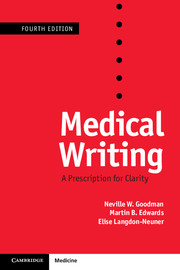It is remarkably easy not to say what you mean.
(D. R. Appleton. Cross words. BMJ. 1994; 309: 1737.)Number: singular or plural?
Errors in which singular subjects govern plural verbs, or vice versa, are examples of what grammarians refer to as errors of concord. Concord – agreement – between subject and verb is the most important type. Mistakes occur most commonly with either . . . or, neither . . . nor, none, in lists, and with collective nouns (particularly when the noun is separated from the verb by a long clause). The error that many people seem to know about, but that is of little importance, is the one made with the word data.
EITHER . . . OR, NEITHER . . . NOR, EACH
In Either Mr A is a liar, or Ms B is psychotic the verb is repeated and there is no confusion: the verb is singular. It is also singular if one or the other is the subject of the same verb: Either Mr A or Ms B is psychotic. Neither behaves the same: Neither Mr A nor Ms B is psychotic. These constructions cannot be applied to more than two choices.
When one of the choices is singular and the other plural, write the plural noun second: Neither the doctor nor the nurses are responsible . . . . The plural noun then governs the verb by the principle of proximity.
In speech, the plural is more natural when either . . . or or neither . . . nor is used.
Each implies a consideration of things taken one at a time and is singular: Each patient was asked . . . . The mistake is likely with the construction Each of the patients . . . when were is more natural but was is correct. Correcting the error of style (. . . of the . . . is unnecessary) makes the mistake less likely and is a good example of how good style can lead naturally to correct grammar.
